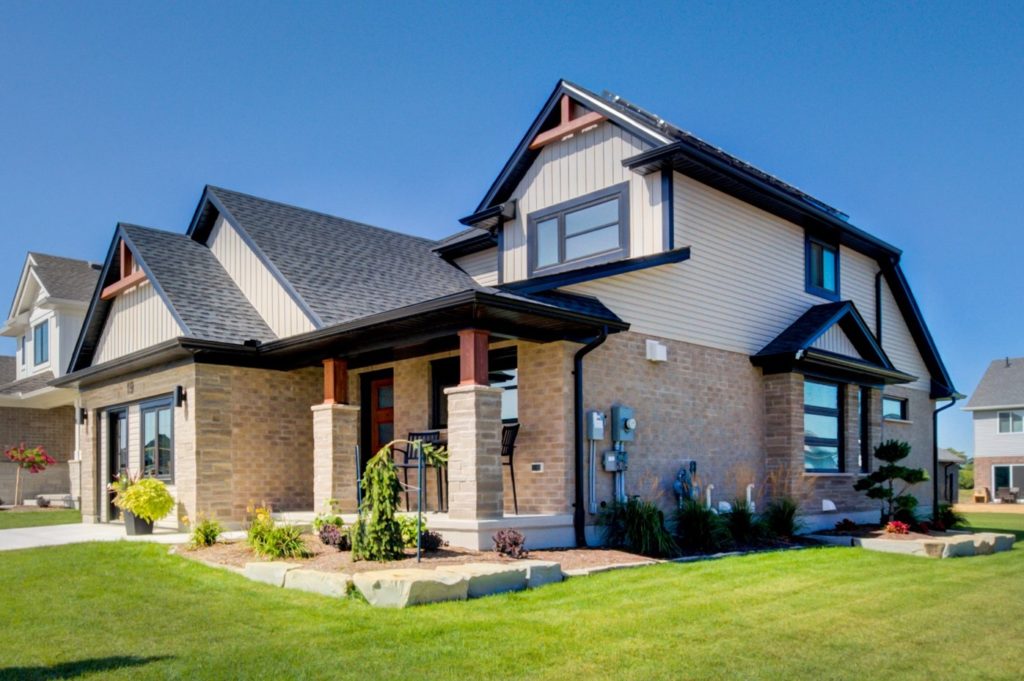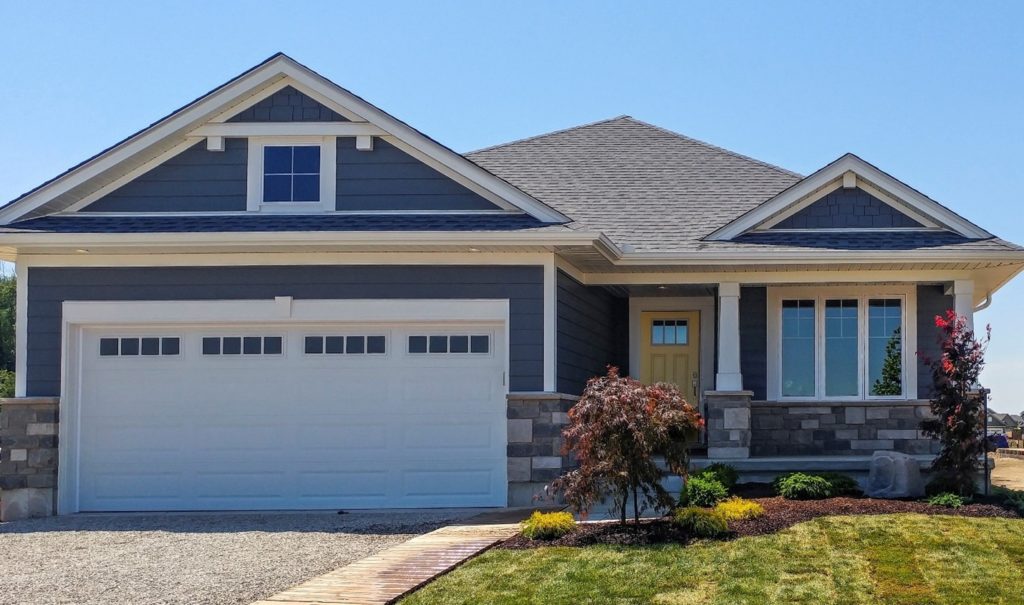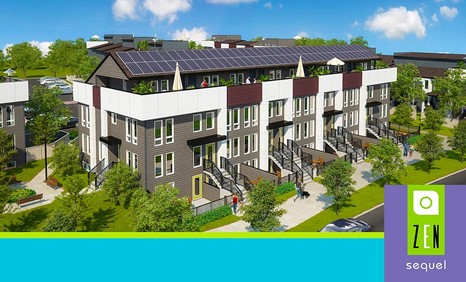 Jennifer Weatherston Vice President of Operations at Doug Tarry Homes |
 Chris Williams Vice President at Avalon Master Builder |
As the effects of climate change redefine how we think about our energy consumption, more home buyers and homeowners are prioritizing home energy efficiency by purchasing a Net Zero Home or renovating their home to Net Zero. But for those who are still exploring their options, a major question asked by customers is: Can a Net Zero Home really be cost-effective for the average buyer?
We asked two Qualified Net Zero Builders who prioritize affordability for their take. Jennifer Weatherston, Vice President of Operations at Doug Tarry Homes in St. Thomas, ON and Chris Williams, Vice President at Avalon Master Builder in Calgary, AB shared with us how builders and homeowners can optimize the financial cost of a Net Zero Home.
Misconceptions about the cost of a Net Zero Home
Many Canadians still believe that Net Zero Homes are a luxury. And yes, like many new products and advancements, at first, they were much more expensive than homes that just meet the building code. But as technology has developed and building science knowledge has become more widespread with more builders voluntarily adopting energy efficient building practices, Net Zero Homes are increasingly becoming more affordable. The initial investment into a Net Zero Home pays off in lower utility bills, greater comfort, healthier living, and a higher quality lifestyle.

“The Palmer,” Net Zero Home by Doug Tarry Homes
With a Net Zero Home, your utility bills fall to an all-time low, and stay low year-round. Why? Net Zero Homes are up to 80% more energy efficient than homes built to code. Net Zero Homes also use renewable energy systems (most commonly, solar panels also known as photovoltaic (PV) solar arrays) to produce what energy the home does need, which protects you from future increases in energy prices. Over the years, that could be a very big deal.
Furthermore, Net Zero Homes are built to a much higher standard than code-built homes. Advanced construction methods and materials, including increased airtightness, better insulation, and high-performance windows, along with superior heating, cooling, and ventilation equipment means a Net Zero Home is designed to stand the test of time.
And as Jennifer Weatherston, Vice President of Operations at Doug Tarry Homes points out, with a Net Zero Home’s added durability and resilience, you save significant money on maintenance costs, while improving the value of your home compared to code-built homes – which also gives it an added advantage in the market when you sell your property.
Healthier, more comfortable living
As with any high-quality product, the benefits are not always financial. “I encourage those who are apprehensive about the cost of a Net Zero Home to consider what their health is worth to them,” said Weatherston. “A Net Zero Home costs you pennies a day over years for immediate improvements to your health and wellness through increased air filtration that reduces allergens and asthma triggers, better indoor air quality, and superior insulation that protects from a drafty indoor environment.”
Chris Williams, Vice President at Avalon Master Builder says that there’s never been a better time to purchase a Net Zero Home. “As the corporate environment shifts to incorporate working from home, people are spending more time in their houses,” said Williams. “Suddenly we’re seeing people spending more on electricity or noticing drafts in their homes, so they’re beginning to recognize that investing in a Net Zero Home is not only better for the environment but will also save them money in the long run and make their time at home more comfortable.”
Overall, while you might spend more upfront for a Net Zero Home, the benefits will outweigh the costs over the long-term both through lower utility bills and maintenance costs and through healthier, more comfortable living.
Voluntary efforts prioritizing Net Zero housing affordability
CHBA members across Canada are voluntarily working on streamlining the cost to achieve Net Zero for new and existing homes, which will then offset the cost to buyers and homeowners.

Net Zero Ready Home “HOPE” by Doug Tarry Homes – Finalist for the Net Zero Home Award in the 2018 CHBA National Awards for Housing Excellence
In 2019, Doug Tarry Homes decided to set Net Zero Ready as their minimum standard for all new homes they build. They now have 238 Net Zero / Net Zero Ready Homes labelled under CHBA’s Net Zero Home Labelling Program. “We work closely with manufacturers and our trade base to optimize the materials used and ways in which our Net Zero Homes are constructed,” said Weatherston. “We utilize lean processes in every one of our builds, including how we can reduce waste and save time, without sacrificing the quality one expects from high-performance homes. For example, while a one-wall assembly may cost more money in labour, we might save a week in time – which can be extremely costly – so we take that into account to help minimize building costs and ultimately the cost to the customer.”

ZEN Net Zero Townhomes by Avalon Master Builder
Avalon Master Builder is currently involved in CHBA’s Net Zero Multi-Unit Residential Buildings (MURBs) initiative, in partnership with Natural Resources Canada (NRCan), to develop Calgary’s first Net Zero and Net Zero Ready stacked townhomes qualified under CHBA’s Net Zero Home Labelling Program. With this project, Avalon’s goal is to give their customers Net Zero for Zero Dollars, meaning that when adding up the cost of the mortgage payment and utility savings, their customers can get an exceptional living experience for no extra money per month over a standard townhome.
How have they achieved this? Years of research and experience. “The process to build a Net Zero Home is becoming more and more standardized as builders and renovators learn from each other, which is helping offset the cost to the customer,” remarked Williams. “There are also plenty of innovative products out there that builders are using to help drive down the cost of building Net Zero Homes.”
Energy efficiency incentives
There are also some government incentives in place to help bring down the initial cost of your new Net Zero Home. For instance, both Sagen and the Canadian Housing Mortgage Corporation (CMHC) offer a 25% mortgage insurance premium refund on Net Zero and Net Zero Ready Homes.
For home energy efficiency improvements, financing tools like Property Assessed Clean Energy (PACE) can help homeowners upgrade their home’s energy performance or install renewable energy systems with no money down, but rather as a loan repaid on a property’s municipal tax bill over time. Further, the recently announced Greener Homes Grant from the federal government can be stacked on top of your local municipal incentives. Natural Resources Canada (NRCan) provides a directory of energy efficient programs for homes, including retrofits and financial incentives.
It’s important to work with a local Qualified Net Zero Builder/Renovator and Energy Advisor (EA) when building or renovating your home to Net Zero; they’re well-versed on how to reduce money spent on the build/renovation, operating costs, and the local incentive and financing programs – and they may even do the rebate/incentive management on your behalf.
So, the answer to the question “Can a Net Zero Home really be cost-effective for the average buyer?” is: we’re getting there. And depending on the home you buy, what you compare it to, and your energy usage, the answer may even be yes when you factor in that your monthly savings averaged over the year offset the increased mortgage. There’s still an additional upfront cost for the extra insulation, better windows, and mechanical systems, but some Net Zero Home builders such as Doug Tarry Homes and Avalon Master Builder have figured out the “recipe” to building these high-performance homes for the least amount of money. And taking the leap will result in long-term utility and maintenance cost savings while improving your family’s health and wellness, minimizing your environmental footprint, and helping to preserve the Earth’s natural resources for future generations.
Learn more about Net Zero Homes at netzerohome.com.
For a list of Qualified Net Zero Builders/Renovators in your area? See CHBA’s list of builders and renovators who are trained in high-performance homes.
